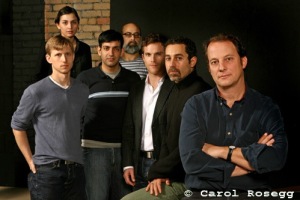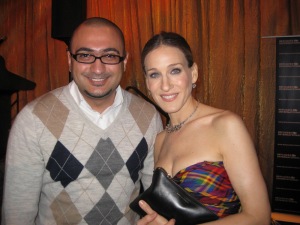On Saturday, Iraqi people are going to the polling centers to cast their ballots in the country’s provincial elections. I’ve been following the elections news and thought I should share some information I have gathered in that regard.
For those interested in understanding what the ABCs of the elections are, read this MSNBC Q&A report.
As you may all know, violence in Iraq has decreased due to several factors, including the segregation of the cities and the neighborhoods within and the joint Iraqi-American military operations that helped fight the insurgents and militias who almost took over the country. But above all those factors was the fact that the Iraqi people themselves have finally realized that there was no need to fight each other anymore. This, of course, excludes the politicians. And this led to a relative reconciliation that has finally penetrated into the warring Iraqi society.
Saturday’s provincial elections are critical. I believe they will be a new kind of test where Iraqis are going to see if those they are voting for will take the country forward and not backwards. It is a test for Iraqis themselves as well. The results will reveal whether the people have learned their lessons of the past elections. Of course, it is hard to assume they did as democracy is still new and it’ll take them decades to understand how it should work.
In this post, I’ll try to post some of the main concerns and most important issues that are related to the elections:
– Shiites, Maliki and the south
In most of the provinces across the country, the direction nowadays is not religious. People no longer care about the fact that the candidate is the son of the prophet, his grandson, or even the prophet himself. All they need is clean water, electricity, jobs and security. This is a milestone in the road of understanding that religion should be separated from the state. In this regard, Iraqi Prime Minister Maliki, an Islamist and a leader of the Dawa Islamic Party and who runs The State of Law Coalition slate, is not using his party’s religious mottos. In an interview with the Washington Post, a campaign manager for the Shiite coalition said, “Maliki is Islamic as a person, but as a statesman? No, he’s secular.” He added that there are other priorities he and his candidates need to consider.
Ghassan Al-Attiyah, a secular political analyst has noted this change as well. Yet, he told the Post that the important question is if Maliki is sincere in “wearing the mantle of reform instead of Islam.”
In a recent poll conducted by the widely-read independent Azzaman newspaper and Al-Sharqiyah satellite TV, Maliki and his State of Law Coalition are on the top of the charts. According to the Washington Post and the New York Times, Maliki’s popularity these days has risen due to his strong statements regarding the centralization of the Iraqi government, which I think is a tactic he’s using to win the votes because he knows some Iraqis, except the Kurds, do not want the country to be divided into federal regions. This tactic is scaring his Kurdish and other Shiite rivals, of course. Abdul Aziz Al-Hakim, the cancer-ill leader of the Islamic Supreme Council of Iraq, has been calling uninterruptedly for separating southern Iraq from the rest of the country in a federal region that will look hugely like Iran and be run by Mullahs and Ayatollahs. The Kurds on the other hand are not worried about that. They already have their federal region, ruled by them democratically. However, their concern is how much power should the central government own. They have not yet gotten rid of the trauma Saddam had caused in brutalizing them and their rights. The outspoken Kurdish member of the Iraqi parliament told the New York Times that “people think [Maliki] has overreached.” It has even reached the extent that Waleed Salih Sherka told the Post that “[Iraqis] got rid of the dictator and nightmare Saddam Hussein only to get this new dictator wearing the uniform of democracy.” Wow, the competition is fierce. Several Iraqi and American newspapers have also mentioned that there have been some heated discussions recently between the Masoud Barzani and Maliki.
In addition to Maliki’s coalition, other candidates from other political parties are competing to win some seats. Those include the communists, the secularists, members of the Fadhila party, the nationalists, and some independent candidates who gain their support from the tribes in the provinces.
– Anbar, once restive now tries to be democratic
Anbar province was one of the most violent part in the country. Who of us doesn’t know the Fallujah battle? Today, the Sunnis in Anbar are focusing on democracy rather than violence. The Post’s Anthony Shadid reported from Ramadi, the provinces’ capital, that competition is fierce between the tribes-backed candidates and the political parties. Anbaris may find it hard to have technocrats or seculars to rule the province. They are left with the tribes because these tribes revolted against Al-Qaeda and restored the power from the terror organization. The tribes insist that The political parties like the Iraqi Islamic Party are not beneficial for the province. Shadid quote one of the candidates calling the IIP “liars” and “cowards.” They call Harith al-Dhari, head of the Muslim Scholars Association and a strong supporter of al-Qaeda in Iraq, “a barking dog” since all he does is complaining from his comfort zone in Jordan.
In any case, the Post reported that of the 29 candidates in Anbar, 15 are tribal figures.
Believe it or not, a group of secular liberals are also running in this election. The Post reports that “Shiites and Kurds sit on their board. So do a Christian and a Jew, one of the handful left in the country.” The paper said they advocate human rights and transparency, and end of corruption and the rehabilitation of Iraq. However, Shadid observed that “no one seems to be listening [to them]. “No one really can,” writes Shadid.
Against the tribes’ candidates run the Iraqi Islamic Party which created a coalition with some tribes. Called “Coalition of the Educated and Tribes for Development,” the coalition includes four Sunni political blocks, according to the Opinion Web site, Niqash. It also mentioned that violent incidents might occur between the competitive factions. One of the candidates Shadid interviewed was Hamid Al-Hayes who threatened to “kill all of their candidates” if theirs are attacked.
– Nineveh and the Kurd-Arab divide
It’s been continuously reported that the Kurds in the north are trying to include some of the non-Kurdish lands to their region. Their efforts include attempting to control parts of Nineveh province which is the home of Mosul, Iraq’s largest second city after Baghdad.
Since the election campaigns started, violence increased in the restive province. Niqash reported that several members of the competing political factions have been killed since the campaigns started. Observers believe these assassinations aim to destabilize the area.
In the northern province there are basically two slates, one include Arabs and the other include the Kurds. The Washington Post observed that Arabs in the province are looking forward to win in order to “appoint a governor and use their political power to roll back the Kurdish expansion.”
***
In the midst of this race of who will run the provinces, election posters have been stuck on almost every building and electricity post. Since corruption is a disease Iraq is still suffering from, some candidates used several methods to make people vote for them. Azzaman reported that Iraqis have been complaining about pressure and threats carried out by some parties to force them vote for their candidates. The threats varied, including assassinations and kidnappings. The paper added that they have even tried to bribe people to vote for their candidates.
***
I wish I had the time to write more about everything related to the elections. However, I suggest you read the articles I have linked to in this post for a better understanding of how this election is shaped.
blog.bassamsebti@gmail.com





